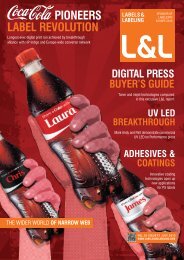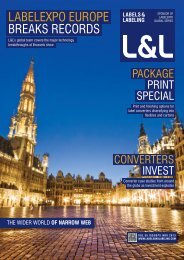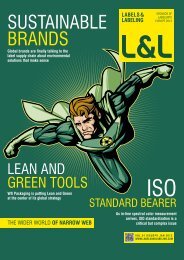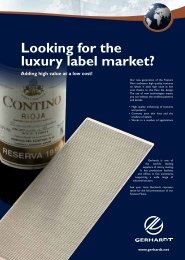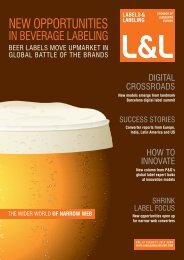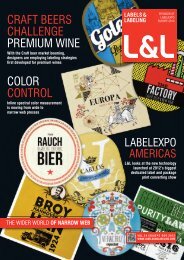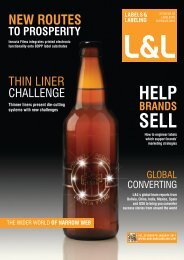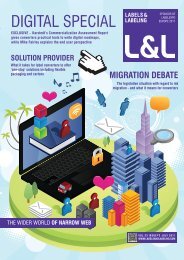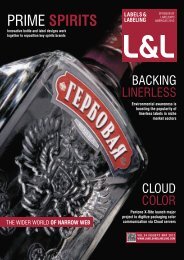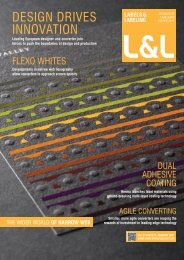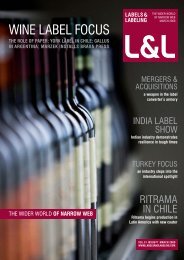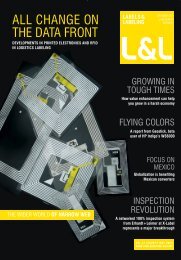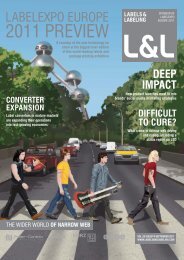You also want an ePaper? Increase the reach of your titles
YUMPU automatically turns print PDFs into web optimized ePapers that Google loves.
LABELS&LABELING |29<br />
Unilever pushes<br />
sustainable growth<br />
REDUCING THE ENVIRONMENTAL IMPACT of its products from materials sourcing to encouraging new<br />
consumer behaviors was the key message of an historic Unilever seminar. Danielle Jerschefske reports<br />
Unilever hosted an intimate group in Washington DC, and simultaneously<br />
in London and Sao Paulo, in April to boldly announce the progress made<br />
with its Sustainable Living Plan launched in November 2010. One of the<br />
world’s largest consumer product companies, Unilever set around 60<br />
targets to be achieved by 2020 through a structured plan around its value<br />
chain. Partners and stakeholders in attendance included regional leaders<br />
from NGOs such as Greenpeace, World Wildlife Fund and the Rainforest<br />
Alliance, GreenBiz.com, government officials, press and analysts. Kees<br />
Kruythoff, president of Unilever North America, said: ‘At Unilever we are<br />
making sustainability a driver for growth. We have made it a part of our<br />
vision and executing it is at the heart of our strategy. We are finding that<br />
when you look at the normal business processes – product development,<br />
sourcing and manufacturing – through the lens of sustainability, it actually<br />
opens up a way for innovation and also cost reduction.’<br />
THE PLAN SETS OUT THAT BY 2020 UNILEVER WILL:<br />
• help more than one billion people improve their health and well-being<br />
• halve the environmental footprint of the making and use of its products<br />
• source 100 percent of its agricultural raw materials sustainably<br />
Already Unilever has reduced its overall environmental footprint by 10<br />
percent through efficiencies in the supply chain and has realized 250<br />
million US dollar cost savings with its program. What’s unique about<br />
the international consumer product supplier’s strategy is that it is taking<br />
responsibility not only for its direct operations, but also for its suppliers,<br />
distributors and – most crucially – consumers who use brands like Dove,<br />
Knorr, Lipton, Lifebuoy and Pureit every day of their lives. ‘Coordinating<br />
communication, education and value to consumers is the only way<br />
Unilever will find long-term success,’ said Kruythoff.<br />
The consumer use phase of a product’s life cycle is the most<br />
challenging because there is no certainty that people will properly place<br />
a plastic container in a recycle bin rather than the trash. So inspiring<br />
consumers to adopt new sustainable products and behaviors is<br />
fundamental to achieving the goals set out in the Unilever Sustainability<br />
Living Plan. Indeed, changing behaviors of consumers is the main barrier<br />
to Unilever reducing the carbon footprint of its products.<br />
The same message came across at the Sustainable Brands conference<br />
in San Diego, which showed that business is collaborating to drive<br />
change and particularly consumer awareness.<br />
Suzanne Shelton of the Shelton Group rightly talked<br />
about ‘The Power of We’. She said: ‘We’ve got to<br />
wake people up and disrupt them!’<br />
UNILEVER HAS ALREADY MADE SIGNIFICANT<br />
PROGRESS IN ITS SUSTAINABILITY CAMPAIGN:<br />
• Today, globally sources 20 percent of energy from<br />
renewables; 100 percent in Europe<br />
• On way to reaching goal of 40 percent renewable<br />
energy sourced by 2020<br />
• On track to meet 2015 commitment to cover all of<br />
its palm oil<br />
requirements from traceable, certified sources<br />
• 35 million people gained access to clean water with<br />
Pureit; goal to reach 500 million by 2020<br />
A key theme has been products that direct<br />
consumers, through clever packaging design, to<br />
reduce energy and water usage whenever possible.<br />
At the recent Finat congress in Athens,<br />
Louis Lindenberg, director of global<br />
packaging sustainability at Unilever,<br />
suggested one possible method of<br />
directing consumers to spend shorter<br />
times in the shower – thermochromic<br />
inks which change color after a set<br />
period of heat buildup.<br />
Unilever CEO Paul Polman<br />
concluded: ‘Sustainable growth will be<br />
the only acceptable model of growth<br />
in the future, Unilever grew well in<br />
2011, but what is encouraging is that<br />
the brands which put sustainability at<br />
the center of their propositions, like<br />
Lifebuoy soap, grew faster than the<br />
average.’<br />
JULY 2012 | L&L



